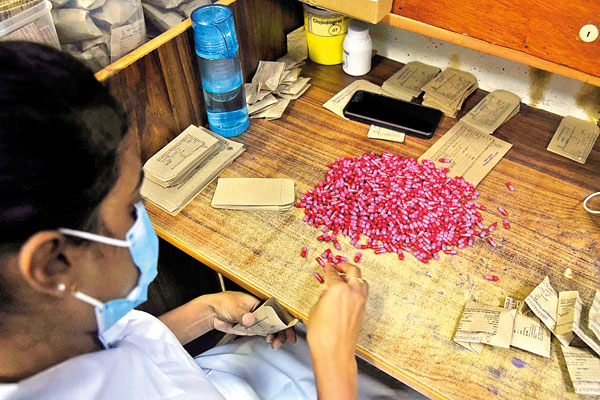News
Health officials sound the siren on worsening medicinal drug shortage
View(s):Ministry calls for buffer stocks of medicines to be distributed from a central unit
By Yoshitha Perera
The Health Ministry told the Sunday Timesthat as part of its emergency measures it has decided to implement a mechanism under which buffer stock medicines in primary health care units and divisional hospitals will be brought to a central unit and distributed based on a need assessment.

Some hospitals’ staff say they only have a few days' supply of life-saving medicines. Pic by Akila Jayawardana
The shortage was caused by a disruption in supply chains and distribution networks and delays in opening letters of credit (LCs) for want of foreign exchange. As a result, the ministry was unable to place orders for regular imports as it had done before the crisis.
The Government Medical Officers Association (GMOA) said there was a severe shortage of medicines and equipment required for eye care and cancer patients, and antibiotics syrup for toddlers.
“Anaesthesia drugs are also in short supply, forcing doctors to postpone surgeries,” GMOA Media Spokesman Dr. Chamil Wijesinghe said.
According to the GMOA, there were five stakeholders in charge of managing and distributing drugs and health care equipment within the country: the Health Ministry, the Medical Supply Division Hospital Online System, the State Pharmaceutical Corporation (SPC) which handles drug importation, the State Pharmaceutical Manufacturing Corporation (SPMC) and the National Medicines Regulatory Authority (NMRA).
“We identified the limited forex issue as the primary cause of the health care system’s drug supply lapses. Another important reason is a lack of coordination among these stakeholders,” Dr. Wijesinghe said.
“We urge the Government to conduct an audit and maintain an online system for drug usage, so we would know how many drugs are distributed, and how much stocks are there,” Dr. Wijesinghe said.
According to him, the Medical Supply Division was supposed to maintain drugs for the next three months but right now some drugs were unavailable, while some medications would not be available in two weeks time, a senior official from the Division said.
The Health Ministry continuously said the problem was a lack of foreign exchange, and lapses in the drug distribution process also occurred due to the fuel shortage.
However, the Treasury and the President hold opposing views and claim that funds were available. Moreover, the GMOA claimed the World Bank, World Health Organisation (WHO), Asian Development Bank (ADB) and other organisations already contributed funds to cover the cost of drug importation. A senior medical officer assigned to a primary health care unit in Balangoda said the unit had not yet experienced a drug shortage.
“The central Government has asked us to return any excess stock we have. We have enough buffer stock to last three months. We are returning the majority of the excess medicines, particularly antibiotics and paracetamol, to the Government while maintaining a stock sufficient to meet our needs for one month,” he said.
The Puttalam-Marawila divisional hospital was also returning excess inventory to the central unit. However, a senior medical official from the hospital said it was experiencing a shortage of oral antibiotics for pediatric patients.
“Doctors at the Colombo National Hospital have already begun to limit the use of paracetamol and surgical consumables such as gloves, gowns, masks, syringes, and gauze.
We are returning surgical consumables in our inventory to the Ministry,” the officer said.
Moreover, some clinical drugs were already in short supply at the Gampola area’s four divisional hospitals. The main items that were either unavailable or in short supply at these hospitals were: Clinical medications for high blood pressure, antibiotic syrups and inhalers for toddlers, surgical cotton wool and surgical medications.
“Acute management drugs, on the other hand, are available for a few months,” Gampola Divisional Hospital Medical Officer Dr. Amila Panagala said.
Dialysis was still being performed on a daily basis at the Medawachchiya Base Hospital, a key cente for the treatment of Chronic Kidney Disease (CKD). However, the hospital warned that medicines were quickly running out and it may only be able to treat kidney patients for one month if stocks were not replenished.
The best way to say that you found the home of your dreams is by finding it on Hitad.lk. We have listings for apartments for sale or rent in Sri Lanka, no matter what locale you're looking for! Whether you live in Colombo, Galle, Kandy, Matara, Jaffna and more - we've got them all!

